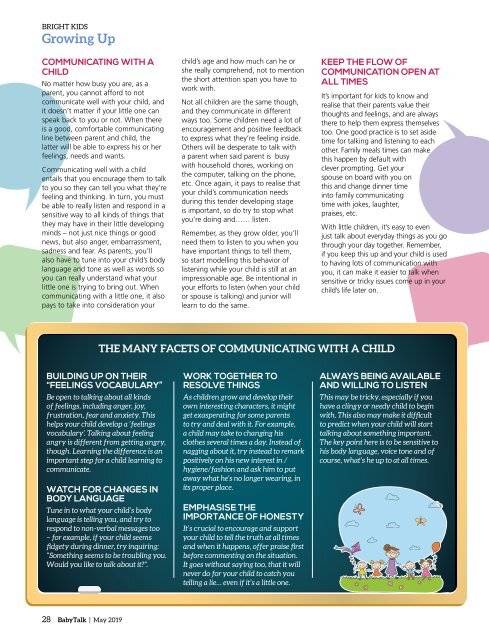Baby Talk May2019
Create successful ePaper yourself
Turn your PDF publications into a flip-book with our unique Google optimized e-Paper software.
Bright Kids<br />
Growing Up<br />
Communicating with a<br />
child<br />
No matter how busy you are, as a<br />
parent, you cannot afford to not<br />
communicate well with your child, and<br />
it doesn’t matter if your little one can<br />
speak back to you or not. When there<br />
is a good, comfortable communicating<br />
line between parent and child, the<br />
latter will be able to express his or her<br />
feelings, needs and wants.<br />
Communicating well with a child<br />
entails that you encourage them to talk<br />
to you so they can tell you what they’re<br />
feeling and thinking. In turn, you must<br />
be able to really listen and respond in a<br />
sensitive way to all kinds of things that<br />
they may have in their little developing<br />
minds – not just nice things or good<br />
news, but also anger, embarrassment,<br />
sadness and fear. As parents, you’ll<br />
also have to tune into your child’s body<br />
language and tone as well as words so<br />
you can really understand what your<br />
little one is trying to bring out. When<br />
communicating with a little one, it also<br />
pays to take into consideration your<br />
child’s age and how much can he or<br />
she really comprehend, not to mention<br />
the short attention span you have to<br />
work with.<br />
Not all children are the same though,<br />
and they communicate in different<br />
ways too. Some children need a lot of<br />
encouragement and positive feedback<br />
to express what they’re feeling inside.<br />
Others will be desperate to talk with<br />
a parent when said parent is busy<br />
with household chores, working on<br />
the computer, talking on the phone,<br />
etc. Once again, it pays to realise that<br />
your child’s communication needs<br />
during this tender developing stage<br />
is important, so do try to stop what<br />
you’re doing and…… listen.<br />
Remember, as they grow older, you’ll<br />
need them to listen to you when you<br />
have important things to tell them,<br />
so start modelling this behavior of<br />
listening while your child is still at an<br />
impressionable age. Be intentional in<br />
your efforts to listen (when your child<br />
or spouse is talking) and junior will<br />
learn to do the same.<br />
Keep the flow of<br />
communication open at<br />
all times<br />
It’s important for kids to know and<br />
realise that their parents value their<br />
thoughts and feelings, and are always<br />
there to help them express themselves<br />
too. One good practice is to set aside<br />
time for talking and listening to each<br />
other. Family meals times can make<br />
this happen by default with<br />
clever prompting. Get your<br />
spouse on board with you on<br />
this and change dinner time<br />
into family communicating<br />
time with jokes, laughter,<br />
praises, etc.<br />
With little children, it’s easy to even<br />
just talk about everyday things as you go<br />
through your day together. Remember,<br />
if you keep this up and your child is used<br />
to having lots of communication with<br />
you, it can make it easier to talk when<br />
sensitive or tricky issues come up in your<br />
child’s life later on.<br />
The many facets of communicating with a child<br />
Building up on their<br />
“Feelings vocabulary”<br />
Be open to talking about all kinds<br />
of feelings, including anger, joy,<br />
frustration, fear and anxiety. This<br />
helps your child develop a ‘feelings<br />
vocabulary’. <strong>Talk</strong>ing about feeling<br />
angry is different from getting angry,<br />
though. Learning the difference is an<br />
important step for a child learning to<br />
communicate.<br />
Watch for changes in<br />
body language<br />
Tune in to what your child’s body<br />
language is telling you, and try to<br />
respond to non-verbal messages too<br />
– for example, if your child seems<br />
fidgety during dinner, try inquiring:<br />
“Something seems to be troubling you.<br />
Would you like to talk about it?”.<br />
Work together to<br />
resolve things<br />
As children grow and develop their<br />
own interesting characters, it might<br />
get exasperating for some parents<br />
to try and deal with it. For example,<br />
a child may take to changing his<br />
clothes several times a day. Instead of<br />
nagging about it, try instead to remark<br />
positively on his new interest in /<br />
hygiene/fashion and ask him to put<br />
away what he’s no longer wearing, in<br />
its proper place.<br />
Emphasise the<br />
importance of honesty<br />
It’s crucial to encourage and support<br />
your child to tell the truth at all times<br />
and when it happens, offer praise first<br />
before commenting on the situation.<br />
It goes without saying too, that it will<br />
never do for your child to catch you<br />
telling a lie… even if it’s a little one.<br />
Always being available<br />
and willing to listen<br />
This may be tricky, especially if you<br />
have a clingy or needy child to begin<br />
with. This also may make it difficult<br />
to predict when your child will start<br />
talking about something important.<br />
The key point here is to be sensitive to<br />
his body language, voice tone and of<br />
course, what’s he up to at all times.<br />
28 <strong>Baby</strong><strong>Talk</strong> | May 2019

















